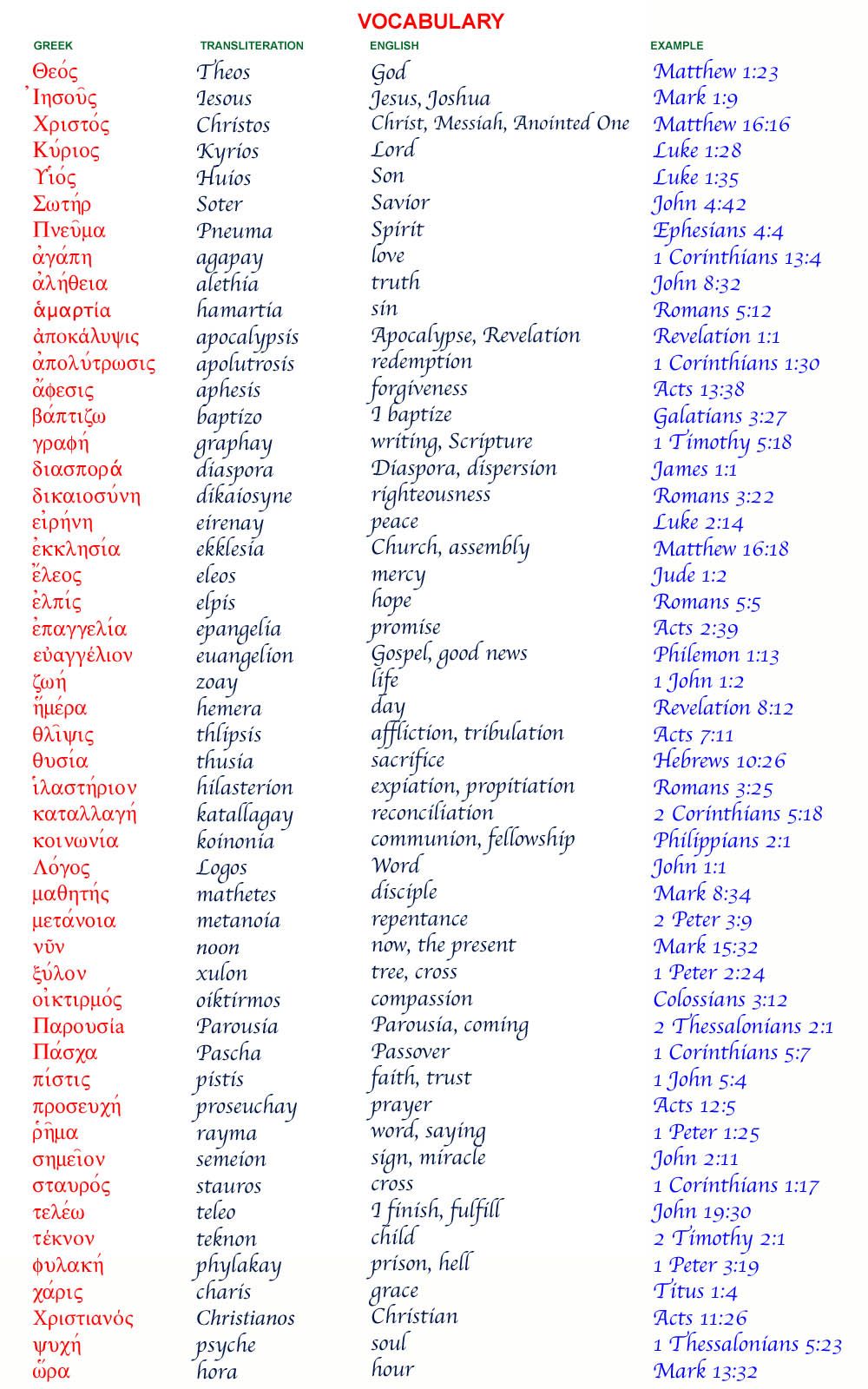The Bible is a collection of 66 books, written in three different languages: Hebrew, Aramaic, and Greek. There are many words that appear in the King James Version of the Bible that are not found in modern English dictionaries. As a result, these words may be difficult to understand when reading the King James Version of the Bible. This article provides information on some common Greek words found in the Bible.
Right here on Churchgists, you are privy to a litany of relevant information on biblical Greek words in English, Greek words and meanings list, and so much more. Take out time to visit our catalog for more information on similar topics.

Greek Words In The Bible
Introduction
Given the fact that most of the New Testament was written in Greek, it is not surprising that many important theological concepts were coined by the Apostle Paul through his use of certain Greek words. Here are a few examples of commonly used biblical words – and some less common ones – from the original Greek text.
Pages in category “New Testament Greek words and phrases”
- Aeon.
- Aeon (Thelema)
- Agape.
- Agape feast.
- Agon.
- Aphedron.
- Apocatastasis.
- Apostles in the New Testament.
Propitiation
Propitiation is the act of appeasing an angry god. In other words, it means that you appease God by sacrificing something to him. This can be an animal or even something else if you have nothing else to sacrifice. It is often used in reference to Jesus’ sacrifice of himself on the cross for our sins so that we may be forgiven and have eternal life.
Stealth
Stealth is a type of deception. It’s used in military operations, espionage, hunting, sports, business and politics.
The word “stealth” comes from the Old English word stelan meaning to steal or rob. A stealthy person is one who moves quietly and takes what they want without being noticed by others.
Stealth has many uses including: stealing objects and escaping detection while doing so; getting into places where you aren’t supposed to be; moving secretly through enemy territory without being seen; avoiding detection by using camouflage or hiding places (like caves); sneaking up on people so they don’t know you’re coming until it’s too late for them to escape your attack
Ekklesia
The word ekklesia is a Greek word meaning “assembly.” It is used to refer to the church in many instances throughout the New Testament. However, its usage in other literature reveals that it has a broader meaning than simply referring to an assembly of people. For example,
Ecclesiastes 5:1-2 uses this word to describe an assembly of mourners at a funeral or burial service. Obviously, there would be no reason for such an assembly if they were not already members of one another’s families and close friends; therefore, this passage implies that even before Jesus’ ministry on earth began, there was an established body of believers who would come together when needed for specific purposes like funerals and weddings (see also Acts 2:41).
Noutheteo (admonish, warn)
Noutheteo is a Greek word that means to warn or admonish. It is used in the New Testament in the following ways:
- To warn someone of danger. In Acts 17, Paul and Silas are sent to Philippi by God, where they will “admonish” and “warn” their listeners about the coming judgment on their city (Acts 16:40). The context shows that Paul and Silas were not just speaking words without any meaning behind them; rather, they were trying to get the people at Philippi to think about what was happening around them at that time and how it could affect their lives. They wanted them to realize how unimportant worldly things were compared with eternity with Jesus Christ (1 Corinthians 7:29).
Sabachthani
- “Sabachthani?”
- This is the Aramaic translation of “My God, why have you forsaken me?” You may be wondering why Jesus didn’t just say this instead of the original Hebrew phrase, but that’s because the Hebrew word for God (Elohim) was not originally used to refer to Jesus’ father.
The Greek word for “God,” Theos, can also mean lord or master. In fact, it was common in ancient Greek and Latin literature to refer to gods with titles such as Zeus, Apollo and Neptune—just like we do today when we call our bosses by their first names instead of Mr./Ms./Dr. So it makes sense that when Jesus spoke on the cross he would use words that reflected his understanding of himself as both fully divine yet human at heart: “Father” became “Father.”
Paideia (discipline, chastisement)
Paideia is a Greek word that means “education.” It’s also used in the New Testament and the Old Testament, as well as in the Apocrypha. Paideia is certainly a word you’ve heard before; it comes up frequently enough to merit its own entry in most dictionaries.
However, paideia refers to more than just formal schooling: it refers to all aspects of learning and teaching, including the content taught within any educational setting (regardless of whether that setting is an institution or simply a family). The term paideia has been used since ancient times and remains relevant today.
Temptation
- Temptation is a trial. It is testing your resolve to make the right decision in the face of adversity. The Bible talks about temptation like this:
- “Therefore, my beloved, flee from idolatry.” (1 Corinthians 10:14)
- “For we are not fighting against flesh-and-blood enemies, but against evil rulers and authorities of the unseen world, against mighty powers in this dark world…” (Ephesians 6:12)
- “…we can rejoice, too—not only because we share Christ’s sufferings but also because we will share his glory.” (Romans 8:17)
Psuche (soul)
As with any translation, the exact wording of the New Testament Greek is not always reflected in English. For example, the word soul (psuche) can be used to refer to either the seat of our emotions or as an entity that possesses both intellect and will. These two definitions are somewhat different from one another, though they both come from the same root meaning: breath. We see this same concept in Genesis 2:7 when God breathes into man’s nostrils and he becomes a living being (nephesh).
Primarily speaking however, psuche is used as the seat of our emotions and intellect which translates into things like love and compassion for others—a sense of responsibility for ourselves—and knowledge about events beyond our immediate surroundings.
Soma (body)
Soma is the Greek word that’s translated as body. It means the physical part of a person. In 1 Corinthians 6:19, Paul writes: “Or do you not know that your body is a temple of the Holy Spirit who is in you, whom you have from God? You are not your own.” This verse shows us that we must take care of our bodies because they’re temples for God’s Holy Spirit to live in.
Praus (gentle, mild)
The Greek word praus (prah-uhs) means “gentle and mild.” It is used in the book of Revelation to describe Jesus, who uses this word to describe himself. The word is also used in Romans about the Holy Spirit.
Euphrosune (cheerfulness, gladness)
The Greek word euphrosune (cheerfulness, gladness) is used in the New Testament only in 1 Peter 4:8, where it is translated as “gladness.” The word is also found in the Old Testament only once, with a similar meaning: Psalm 4:6.
Heautou (own selves)
Heautou is a compound Greek word made up of the preposition “en” and the verb “heautou”, as in, “to himself”. It means “own selves” or “self-controlled”.
Paroxysm (a sudden outburst of emotion or action ) – 2 Cor. 9 :2 KJV. ‘…for your zeal hath provoked very many’. – Modern version takes account of the Greek word paroxysm and reads; “…but because of other men’s prouderies”. Good example of word play in translating !
Paroxysm is a sudden outburst of emotion or action. The word paroxysm is used in the New Testament in 2 Corinthians 9:2. “”For ye know the grace of our Lord Jesus Christ, that, though he was rich, yet for your sakes he became poor, that ye through his poverty might be rich.” The Greek word for “became” here is έγεννήθη (egennethe), which means “became” in English. However, it also has an additional meaning: “to be born”. So what does this verse actually say? If you read it aloud and listen carefully to how it sounds when spoken at a normal pace and volume, you’ll discover that there are two possible interpretations of this passage; one based on sound and one based on sense.
The first interpretation says that Jesus became poor because he wanted us all to become rich through him! This seems like a strange idea because most people would assume that when someone becomes something then they must have been something else before hand (e.g., “He became a doctor”). But according to this reading we’re supposed to understand that Jesus became poor so that we could become rich through him!
Conclusion
My purpose has been to illustrate how the KJV translators were working with a limited vocabulary, thus had no choice but to use words that could be read in different ways. They could not have known the future development of the language, nor our modern understanding of Greek words. Therefore I hope you will agree that we need to depend on the Holy Spirit for guidance in using ‘The Word’ as our guide and be open minded about the way we interpret it.
